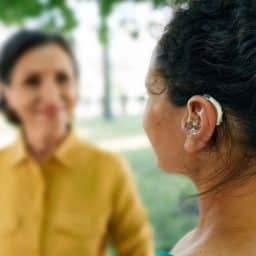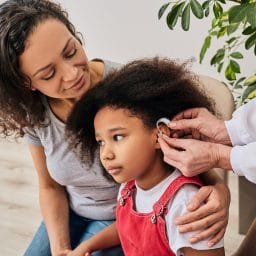What Should I Do if I Don’t Like My Hearing Aids?

If you’ve recently decided to try hearing aids and are finding that you don’t like using them, don’t fear. There are many common issues that first-time hearing aid users face that have simple solutions to help improve their listening experience. Common Hearing Aid Complaints Discomfort Research has shown that discomfort is one of the more…
How to Enjoy a Day on the Beach with Hearing Aids

Is there any summer activity more refreshing and relaxing than traveling to the beach? If you’re headed somewhere tropical this summer and you’re one of the 16% of adults ages 20 to 69 who wears hearing aids, be sure to follow our tips to make the most of your trip while keeping your devices safe….
Four Tips for Dining Out With Hearing Loss

The bustle and background noise of places like Horizon’s Restaurant can make dining out a challenge for people with hearing loss. Thankfully, there are several ways to help yourself hear better and enjoy your dining experience. Why Dining Out Is Harder With Hearing Loss Restaurants are a notoriously noisy environment. A study of 30 casual…
What Is Mixed Hearing Loss & How Is It Treated?

If you’re one of the 48 million Americans with hearing loss, it’s important to seek treatment right away. Left untreated, hearing loss is associated with anxiety, depression, falls and even dementia. If you have a type of hearing loss known as mixed hearing loss, treatment may not be straightforward. Below we review what mixed hearing…
Understanding the Results of Your Hearing Test

Hearing loss is a common condition that gets more likely as we age. If you’ve noticed that you’re having to turn up the television louder than usual or that conversations are harder to follow when you’re out with friends at Brightside Café, it might be time to schedule a hearing test. Reasons to Have Your…
Benefits of Treating Hearing Loss Early

Hearing loss is a progressive condition, meaning it develops slowly over time. Many people don’t even realize they have hearing loss until it has advanced beyond a stage that is easily treatable. In fact, only 20% of people who could benefit from treatment actually wears hearing aids, and those that do wait an average of…
3 Ways to Protect Your Hearing Aids While Swimming

Moisture damage is one of the top reasons people bring their hearing aids in for repair. That’s why if you’re planning on spending time in the pool at Leif Erikson Park this summer you need to know how to protect your device from the water. Avoid Exposing Your Hearing Aids to Moisture Take out your…
How to Help Your Child Keep Their Hearing Aids On

It can be a challenge to get your child to wear their hearing aids consistently when they first get them. If you are a struggling parent, know that you are not alone. Let’s look at a few tips to help make the process easier for both of you. Getting Your Child Comfortable Wearing Hearing Aids…
How Does Hearing Loss Impact Learning in Young People?
Hearing is one of the most important senses when it comes to the learning process. This is because ‘overhearing’ is how children learn the bulk of their vocabulary. Students with hearing loss don’t have the same access to information as their peers, as they cannot overhear as well, even with assistive listening technology. Below we…
What Could the Future of Hearing Aids Hold?

Our brains are truly amazing. From downloading information from books to picking out individual voices somewhere such as Press Start, our brains are able to process information in a way that technology struggles to replicate. While today’s hearing aids have difficulty switching focus from speaker to speaker in a group setting, the hearing aids of…